This article highlights the essential ABA supervision requirements that every parent should know to effectively support their child's therapy. Understanding the supervision process is crucial, along with knowing the qualifications of supervisors and the minimum oversight hours required. Plus, parental involvement plays a significant role in ensuring children receive high-quality care. By focusing on these aspects, we can work together to enhance treatment outcomes for our little ones. Let’s explore this together!
Navigating the intricacies of Applied Behavior Analysis (ABA) therapy supervision can feel overwhelming for parents on their child's treatment journey. With so many requirements and qualifications to consider, it's understandable that the stakes feel high when it comes to ensuring effective support for your loved ones. In this article, we’ll explore the essential ABA supervision requirements that every parent should know, highlighting the vital role you play in your child's progress.
So, how can you effectively advocate for your child's needs amidst the complexities of supervision? What strategies can you employ to foster a collaborative relationship with therapists? Let’s explore this together! By understanding these elements, you can feel more empowered and connected as you navigate this journey.
At Rori Care - ABA Therapy, we understand that every young person has unique needs. That's why we create personalized treatment plans that prioritize their individual requirements. By integrating advanced AI technology, we’ve made the supervision process smoother than ever! Imagine clinicians spending 50% more time on direct treatment because they can automatically generate progress reports.
This innovative approach not only enhances communication but also fosters teamwork between parents and therapists. We believe that every young individual deserves the highest standard of care. With AI-driven analytics, our skilled behavior analysts can monitor progress more efficiently, set clear, measurable goals, and make real-time adjustments to improve treatment outcomes.
What does this mean for families? You get to be an active participant in your child's development! Together, we can strengthen the transformative potential of ABA treatment. Let’s explore this journey together and ensure your child receives the best support possible!

The supervision process in ABA therapy is guided by ABA supervision requirements, which include several important steps:
To kick things off, supervisors conduct thorough assessments that can take several hours. This helps establish a baseline for your child's behavior and skills. Think of it as laying the groundwork for creating measurable objectives that cater to their unique needs.
Regular monitoring is crucial to fulfill ABA supervision requirements, as it allows supervisors to keep an eye on progress and tweak the treatment plan based on the data collected during sessions. Feedback sessions are a wonderful opportunity for parents to communicate openly with supervisors, fostering a collaborative environment. We encourage parents to ask questions and actively participate in the supervision process—your involvement can make a significant difference in your child's success!
As one behavior analyst noted, 'Active parental involvement in ABA intervention not only enhances therapeutic results but also raises the overall quality of family life.' To further support your child's progress, consider keeping a daily record of behaviors and interventions. Sharing this during feedback sessions can really help inform treatment adjustments. This collaborative approach ensures that therapy stays responsive to your child's evolving needs, ultimately leading to more effective outcomes. Let’s explore this journey together!
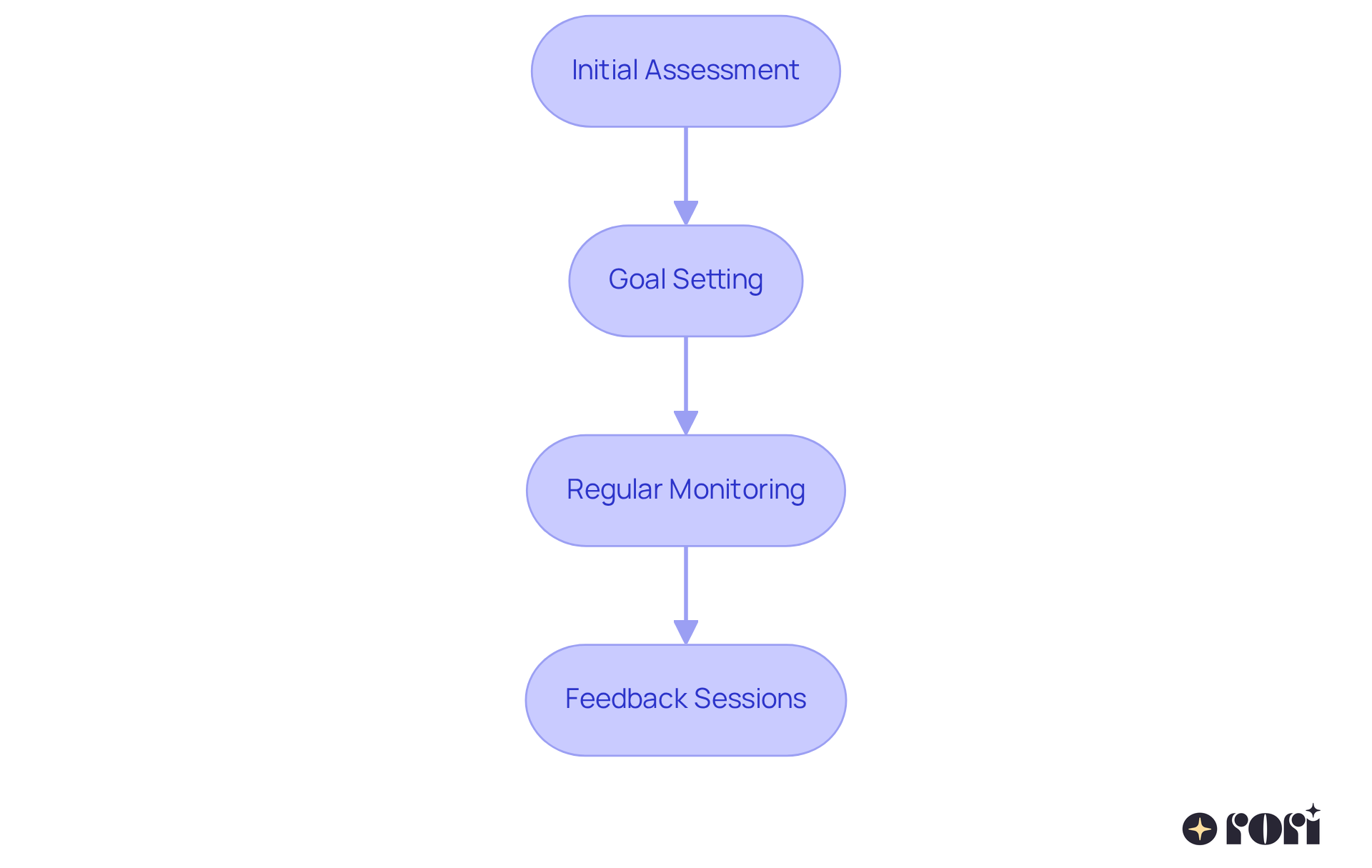
As a parent, it is crucial to understand the ABA supervision requirements for Registered Behavior Technician (RBT) supervisors. These professionals must hold a certification from the Behavior Analyst Certification Board (BACB), such as Board Certified Behavior Analyst (BCBA) or Board Certified Assistant Behavior Analyst (BCaBA). They also need to complete an 8-hour BACB-approved training course focused on oversight practices and have hands-on experience in applied behavior analysis.
Did you know that RBTs must comply with ABA supervision requirements by receiving oversight for at least 5% of their total service hours each month? This oversight includes direct observation and feedback sessions that are essential for their growth and effectiveness in line with ABA supervision requirements. It’s important for you as a parent to confirm the qualifications of your child’s overseer. This ensures they meet the ABA supervision requirements, which directly impacts the quality of guidance and treatment your child receives.
Furthermore, RBTs must finish their certification by passing the board exam, which tests their knowledge of the RBT Task List. This list is vital because it ensures they are well-equipped to implement effective ABA strategies. According to the BACB, the ABA supervision requirements help ensure that RBTs act ethically, build their skills, and follow professional standards.
Effective oversight, which includes organized observations and consistent feedback, is linked to improved therapy results while adhering to ABA supervision requirements. So, it’s vital for you to prioritize the ABA supervision requirements of those who are managing your child’s care. By understanding these qualifications and the importance of RBT certification, you can empower yourself with ABA principles and strategies. This knowledge enhances your ability to support your child's behavioral goals through active involvement and informed decision-making. Let’s explore this together!
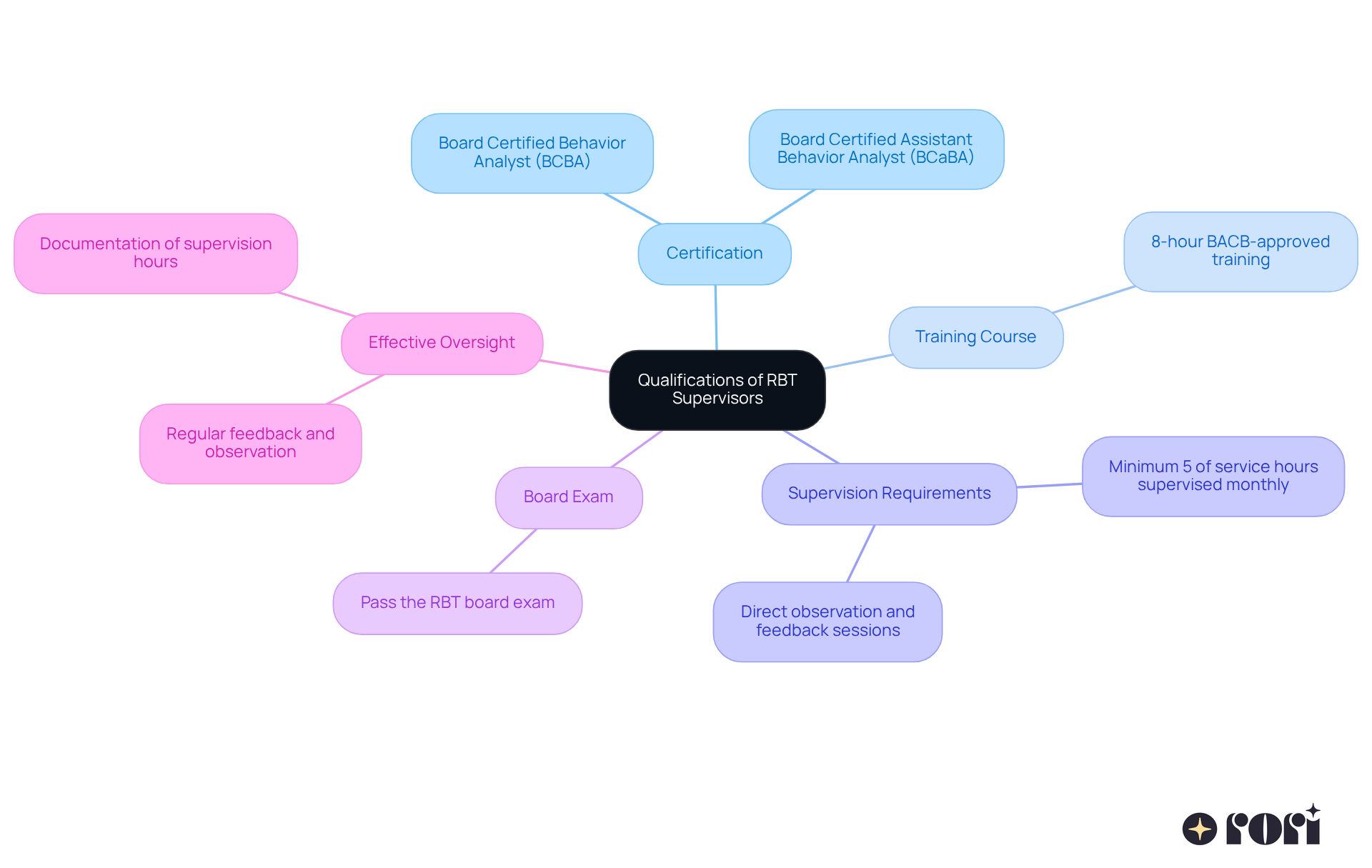
In line with the aba supervision requirements established by the Behavior Analyst Certification Board (BACB), Registered Behavior Technicians (RBTs) need to have oversight for at least 5% of their total service hours each month. So, if an RBT logs 100 hours in a month, they’re required to have at least 5 hours of oversight. This organized supervision is super important because it ensures that RBTs comply with the aba supervision requirements to receive the guidance and support they need to provide effective treatment.
Parents, you play a vital role in this process! By keeping track of these oversight hours and maintaining open communication with supervisors, you help ensure that everything runs smoothly. This attentiveness not only helps meet BACB standards but also aligns with ABA supervision requirements, thereby enhancing the overall effectiveness of the support provided to your child. Research shows that adhering to aba supervision requirements can lead to better outcomes—clients experience a 30% increase in positive behavioral results when RBTs receive the right guidance.
So, understanding and monitoring the aba supervision requirements is essential for parents dedicated to their child's success in ABA treatment. Let’s explore this together! We’re here to help you every step of the way!
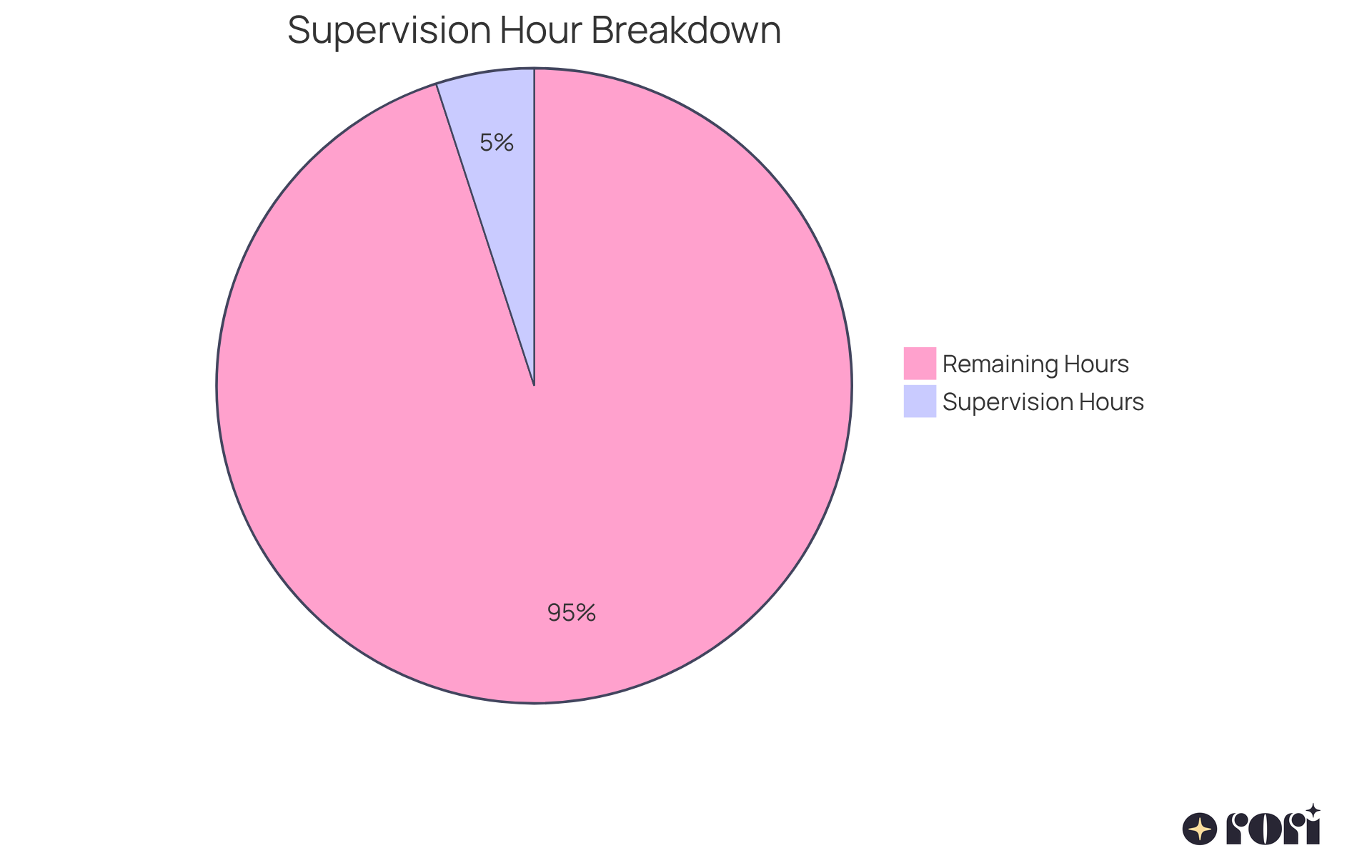
Direct oversight means keeping an eye on the Registered Behavior Technician (RBT) during treatment sessions. This real-time monitoring allows for instant feedback and guidance, which is super helpful for improving treatment outcomes. Supervisors can tackle challenges as they pop up and adjust strategies right away! 😊 Did you know that the ABA supervision requirements set by the Behavior Analyst Certification Board include at least 2 hours of supervision for every 40 hours worked? That’s about 5% of the total service hours!
On the flip side, we have indirect oversight. This includes things like reviewing paperwork, discussing cases, and giving feedback without being in the room during treatment. Both types of oversight are crucial for ensuring high-quality care. Interestingly, studies show that many guardians see direct oversight as more beneficial for their child’s development.
Understanding the balance between direct and indirect oversight helps ensure that children get the most effective support possible. Plus, it empowers parents to make informed decisions about their child’s therapy. It’s also important to remember that failing to meet the ABA supervision requirements for oversight hours could jeopardize RBT certification. This really emphasizes how essential regular guidance is in relation to the RBT Task List and board exam prerequisites. Let’s explore this together and ensure your child gets the best care! We’re here to help you every step of the way!
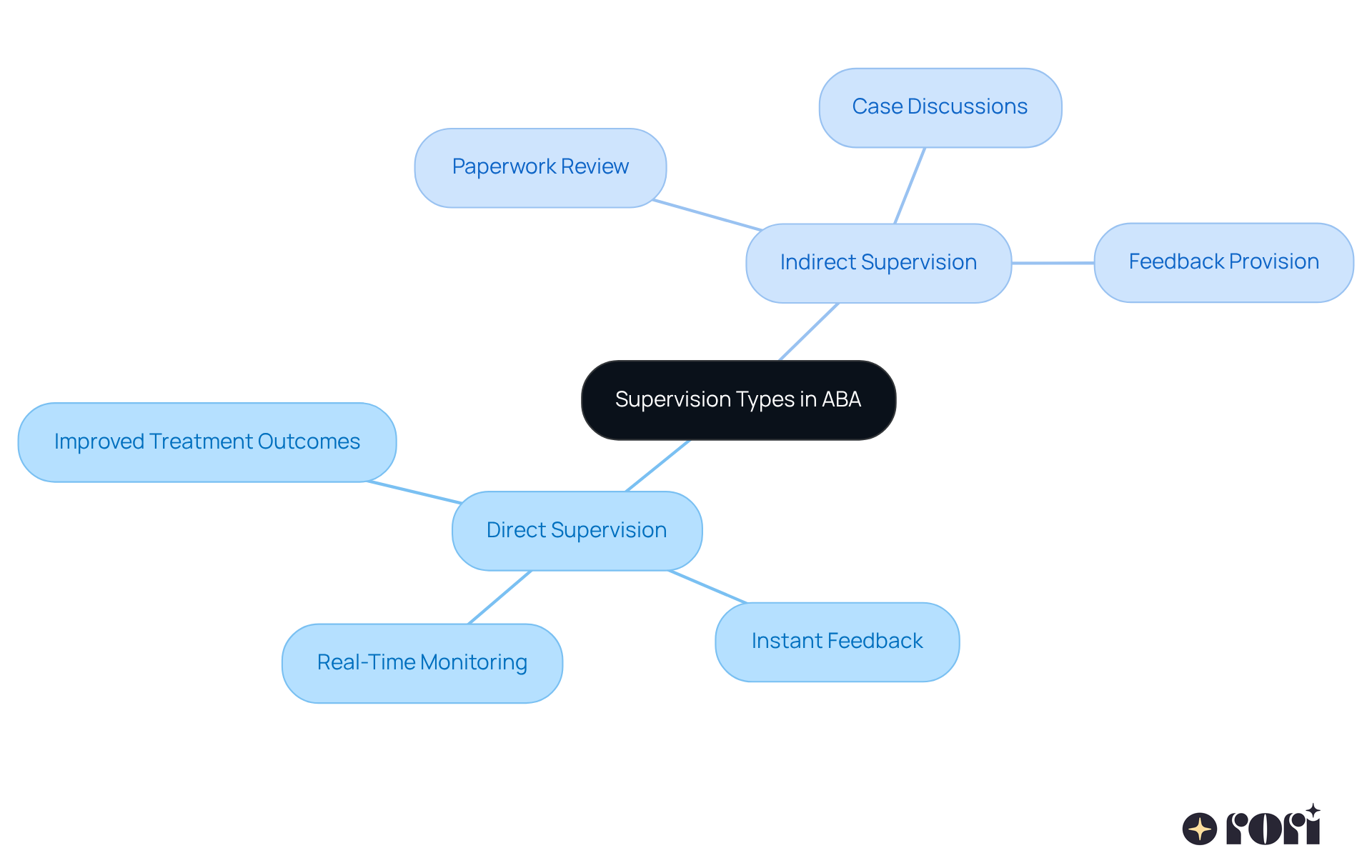
Effective documentation and record-keeping are key parts of ABA oversight! 🌟 Supervisors need to keep detailed records of supervision sessions, including:
This thorough documentation not only ensures compliance with BACB standards but also addresses ABA supervision requirements while serving as a valuable resource for tracking your child's progress over time.
Research shows that gathering precise data can significantly influence treatment effectiveness. It helps in making informed adjustments to care plans. Parents, we encourage you to ask for access to these records! This promotes transparency and keeps you informed about your child's therapy and the oversight process.
By engaging with these records, you can gain a clearer understanding of the strategies being used and how your child's development is progressing. Let’s explore this together! Your involvement is crucial in supporting your child's journey.
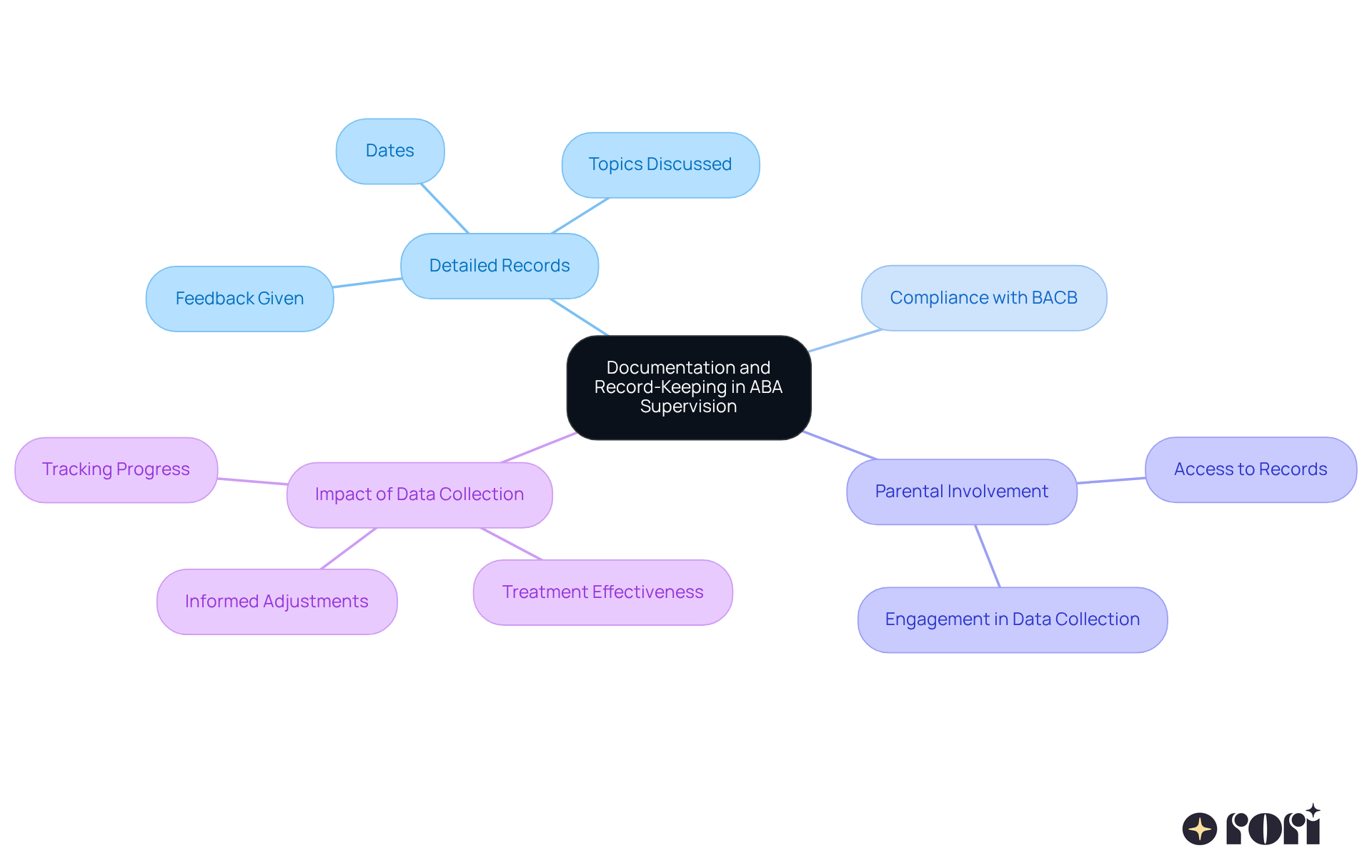
When it comes to RBT supervision, ethical considerations are super important! They focus on keeping your child safe and happy, respecting their privacy, and ensuring informed consent. Supervisors must follow the BACB's ethical guidelines, which emphasize treating clients with dignity and respect.
Parents, you have a vital role in this journey! It's essential that you feel empowered to share any concerns about ethical practices with your child's supervisor. Open communication is key to making sure your child's rights are upheld throughout their treatment.
Research shows that many parents express worries about ethical practices in ABA treatment. This highlights the need for transparency and trust in the therapeutic relationship. By engaging in conversations about confidentiality and ethical standards, you can greatly impact the quality of care your child receives. Together, we can create an environment where ethical considerations lead to better treatment outcomes. Let’s explore this together!
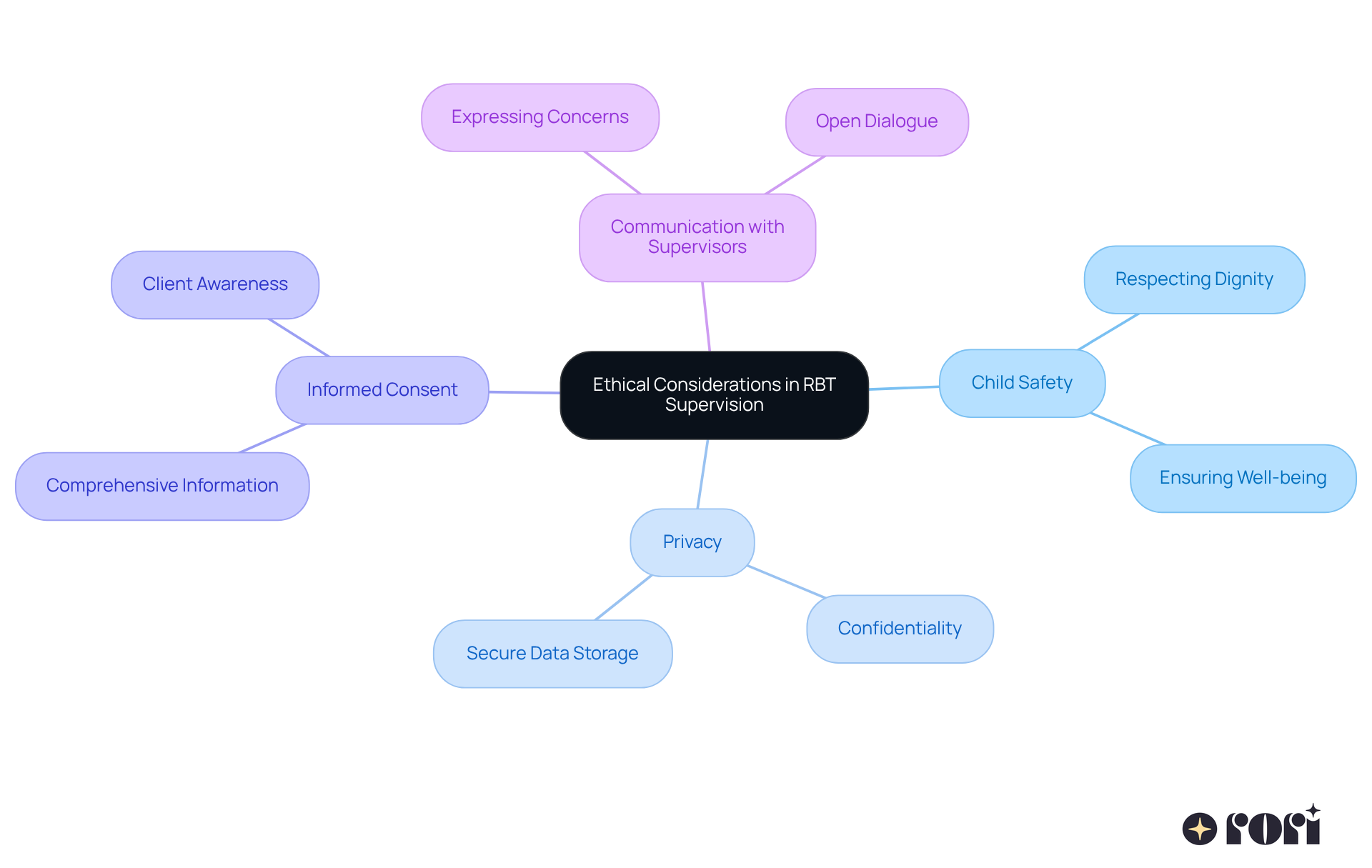
Continuous professional growth is so important for RBT supervisors! It helps them stay updated on the latest research, techniques, and ethical guidelines in ABA practices. By engaging in regular training, attending workshops, and participating in peer reviews, supervisors can really enhance their skills.
Studies show that effective training for supervisors is essential to fulfill ABA supervision requirements and greatly improves the quality of RBT oversight. This, in turn, leads to better outcomes for youth undergoing ABA treatment. As a parent, it’s a great idea to inquire with your child's supervisor about the ABA supervision requirements for their professional development activities. You want to ensure they’re equipped with the most current knowledge and practices.
This proactive approach not only supports the supervisor's growth but also boosts the overall effectiveness of the therapy your child receives. Let’s explore this together! Your involvement can make a real difference!
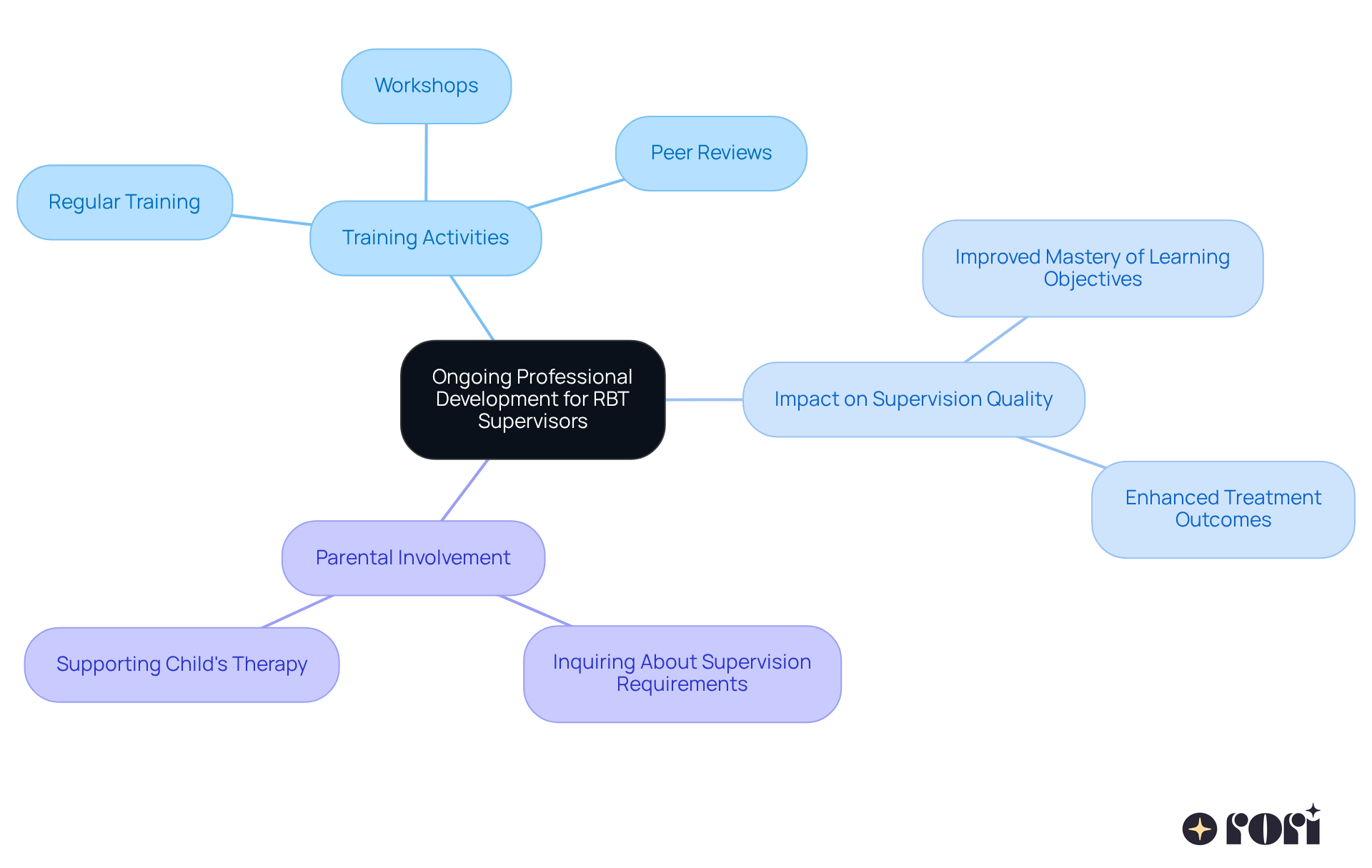
RBT oversight can often present several challenges that may impact the quality of care for children with autism. Many parents find themselves facing limited access to qualified supervisors, which can hinder the effectiveness of the support their children receive. Balancing oversight with other responsibilities can also be a significant challenge. After all, many managers juggle multiple cases, leading to inconsistent communication and monitoring. Plus, arranging oversight meetings can be especially tough, leaving parents feeling like their child's unique needs aren't being fully met.
To navigate these hurdles, it's crucial for parents to keep those lines of communication open with supervisors. Regular check-ins can ensure that any concerns are addressed quickly and that the child's progress is monitored effectively. Advocating for their child's needs is vital; parents should feel empowered to express their expectations and seek clarification on treatment plans. By fostering a collaborative relationship with supervisors, caregivers can enhance the quality of oversight and better support their child's development.
Moreover, caregiver education plays a key role in this journey. By understanding ABA principles and strategies, caregivers can make informed decisions that positively impact their child's progress. Actively participating in their child's therapy not only leads to better behavioral outcomes but also empowers caregivers, reducing stress and improving family dynamics. Research shows that a significant number of caregivers have concerns about the adequacy of the ABA supervision requirements their child receives. This underscores the importance of being proactive in the supervisory process. Insights from both parents and specialists emphasize that effective communication and advocacy are essential strategies for tackling the challenges surrounding RBT oversight.
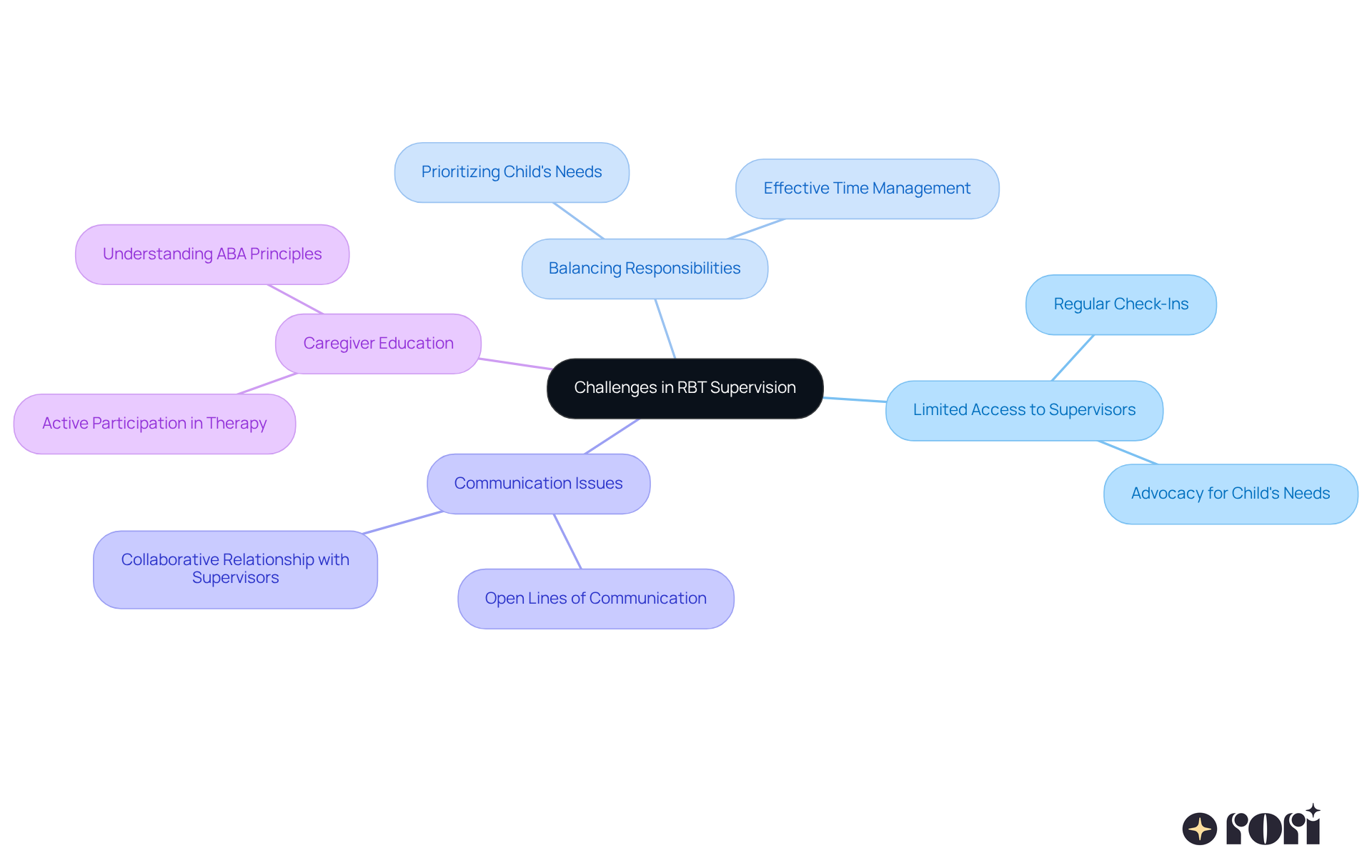
Enhancing the oversight process in ABA therapy can be a rewarding journey for parents! One of the best ways to get involved is by actively participating in supervision meetings. This means asking questions, providing constructive feedback, and keeping those lines of communication open with the supervisor. 🌟 Sharing your child's progress and any concerns can really strengthen that collaborative relationship. When you engage like this, it not only creates a supportive atmosphere but also boosts therapy outcomes for your little one.
It’s fascinating to note that studies show active involvement from caregivers leads to improved overall childhood experiences. This makes it super important for parents to be part of the process! By working closely with supervisors, you can ensure that interventions are tailored to your child's changing needs, which ultimately supports their development.
Consider setting up regular check-ins with your child's supervisor to chat about progress and strategies. With Rori Care's behavior care engine constantly updating treatment plans based on progress report data, you can feel confident that your involvement is truly making a difference. Remember, meeting the ABA supervision requirements emphasizes the importance of parental involvement in Applied Behavior Analysis (ABA) therapy, which is increasingly recognized as a key factor in enhancing therapy outcomes for children with autism spectrum disorder (ASD). Let’s explore this together and make a positive impact on your child’s journey!
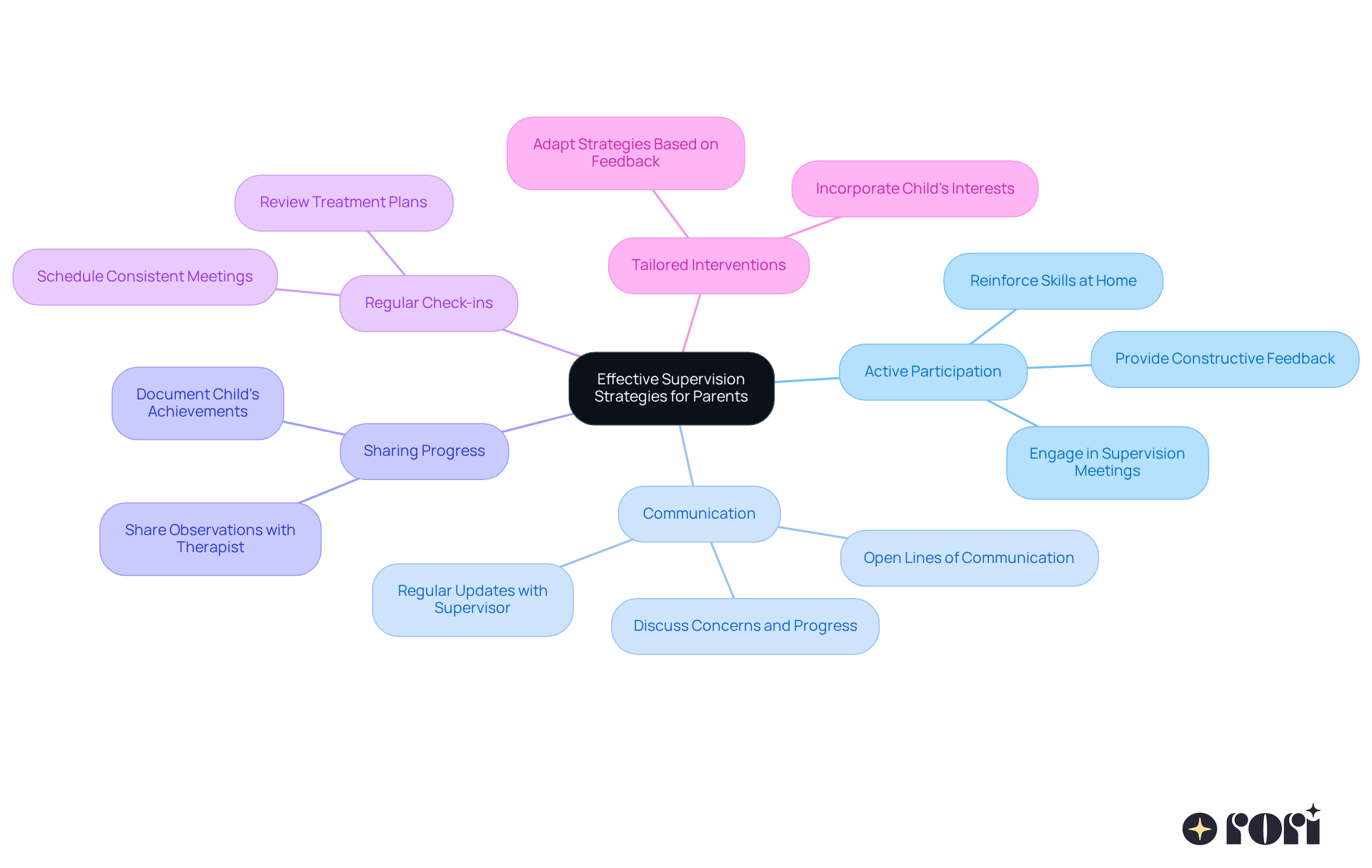
Understanding the intricacies of ABA supervision is essential for parents who want to ensure their children receive the best possible support. This article has outlined the fundamental aspects of ABA supervision requirements, emphasizing the importance of active parental involvement in the supervision process. By grasping these concepts, parents can play a crucial role in enhancing their child's therapeutic experience and outcomes.
Key points discussed include:
Together, these elements form a comprehensive framework that empowers parents to advocate for their child's needs and contribute to their success in ABA therapy.
Ultimately, the journey through ABA therapy is a collaborative effort that thrives on communication, education, and active participation. Parents are encouraged to engage with supervisors, ask questions, and stay informed about their child's progress. By doing so, they can help cultivate an environment that prioritizes their child's growth and well-being. Let’s ensure that the transformative potential of ABA treatment is fully realized together! 😊
What is Rori Care - ABA Therapy?
Rori Care - ABA Therapy provides personalized treatment plans for young individuals, focusing on their unique needs and utilizing advanced AI technology to enhance the supervision process.
How does Rori Care utilize AI technology in ABA therapy?
The integration of AI technology allows clinicians to generate progress reports automatically, enabling them to spend 50% more time on direct treatment, which improves communication and teamwork between parents and therapists.
What are the key steps in the ABA supervision process for parents?
The key steps include initial assessment, goal setting, regular monitoring, and feedback sessions. These steps help establish a baseline for the child's behavior and skills and ensure ongoing adjustments to the treatment plan.
Why is regular monitoring important in ABA therapy?
Regular monitoring is crucial to track progress and make necessary adjustments to the treatment plan based on collected data, ensuring that therapy remains responsive to the child's evolving needs.
How can parents actively participate in the ABA supervision process?
Parents are encouraged to communicate openly during feedback sessions, ask questions, and keep a daily record of behaviors and interventions to inform treatment adjustments.
What are the qualifications required for RBT supervisors?
RBT supervisors must hold a certification from the Behavior Analyst Certification Board (BACB), complete an 8-hour BACB-approved training course, and have hands-on experience in applied behavior analysis.
What is the oversight requirement for Registered Behavior Technicians (RBTs)?
RBTs must receive oversight for at least 5% of their total service hours each month, which includes direct observation and feedback sessions to enhance their effectiveness.
Why is it important for parents to confirm the qualifications of their child's RBT supervisor?
Confirming the qualifications ensures that the supervisor meets ABA supervision requirements, which directly affects the quality of guidance and treatment the child receives.
What is the significance of the RBT Task List?
The RBT Task List is crucial as it ensures that RBTs are well-equipped to implement effective ABA strategies, which is assessed through the board exam they must pass for certification.
How does effective oversight impact therapy results?
Effective oversight, which includes organized observations and consistent feedback, is linked to improved therapy outcomes while adhering to ABA supervision requirements.